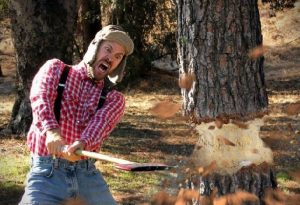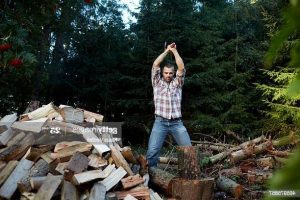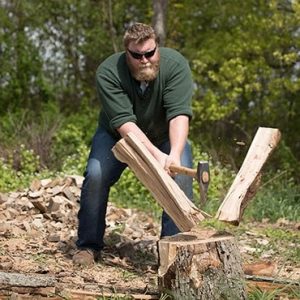Chopping Wood
Vocabulary
| chop | rest (2) | sell/sold/sold |
| pile | weight | stand/stood/stood |
| wood | break (2) | fall/fell/fallen |
| log (3) | keep (2) | resume (2) |
| own | too many | thing (2) |
| notice | slightly | high/higher/highest |
| even | anymore | overtake |
| really | too much | more or less |
| rub | strong | for a while |
| gee | amount | trunk (3) |
| blade | shoulder | sandstone |
| axe | shrug | take it (2) |
| while | area (3) |



Chopping Wood
In his book Be Great, Peter H. Thomas tells the story of two farmers in a village who decided to chop down some trees and sell wood in a market.
One of them stood 195 centimeters tall and weighed 125 kilograms. The other was 165 cm and 65 kg.
Morning Break
It was autumn. Early in the morning, they went to a area of trees and began chopping them down, and cutting them into logs.
At about 9:30 am, the 165 cm man stopped work and took a break. He rested and ate some plums. The 195 cm man did not — he kept working.
Lunch
Three hours later, they both stopped for lunch. The 195 cm man ate his lunch in 20 minutes, rested for another 10, and resumed chopping wood.
The 165 cm man meanwhile, took about 45 minutes to eat his lunch, then rested for another 30 before returning to his pile of tree trunks.
The Afternoon
When the afternoon break came by the same thing happened as in the morning.
Then at 4:00 pm, the 165 cm man left and went home. The 195 cm man, however, stayed on working late into the night.
The Weeks
The same thing happened the next day . . . and the next. This went on for about two weeks.
By this time, the two men had created two large piles of logs, with the big man’s pile being slightly higher than the little man’s pile.
After about three weeks of chopping, the big man noticed that the little man’s pile was more or less even with his own.
At the end of the fourth week, the little man had overtaken the big man in the amount of wood they had chopped.
Why?
This was too much for the big man. He couldn’t take it any longer.
Then just as the little man was finishing his afternoon break and returning to chopping wood, the big man came up to him and said:
“I cannot understand why you have more logs chopped than I do. You are smaller than I am, and you are not as strong as I. You work less hours. You take more breaks.”
Shrug
The little man said nothing for a while, then he shrugged his shoulders and replied, “Gee . . . I don’t really know . . .”
The big man watched as the little man returned to his tree trunks. Then he saw him take a sandstone from his pocket and began rubbing his ax blade with it.
Questions
Oak. Two men were chopping wood as firewood for their fireplaces at home. Is this true or false?
Maple. Did they look the same?
Pine. They worked the same amount. Is this correct or incorrect?
Birch. What happened after two weeks? After three and four weeks?
Cherry. Was the big man baffled (confused)? Why was he baffled?
Eucalyptus. The little man told the big man his “secret”. Is this right or wrong?
Palm. Is there a moral or lesson to the story? What is the moral or lesson of the story?
Baobab. I have used an axe; I have chopped and split wood. Yes or no?
Cedar. Can you give examples of this from school, companies, work, sports or other aspects of life?
Redwood. I know people who are like the big man. Yes or no?
Mangrove. Do you know anyone who is like the little man?
Olive. How can you “sharpen your axe”? How can you become more efficient and productive?
